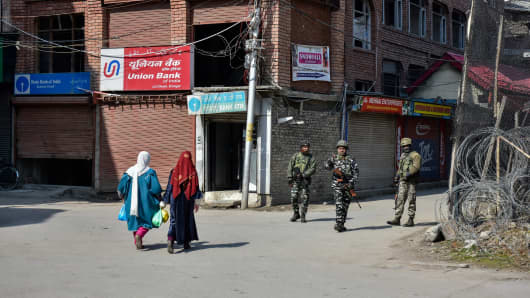Tensions between nuclear rivals India and Pakistan flared up this week after both sides carried out tit-for-tat air strikes and shot down each other's fighter jets, prompting global concerns over a potential outbreak of war in South Asia. Pakistan said it also captured an Indian pilot who was released on Friday as a gesture of peace towards New Delhi from Islamabad.
The mountainous region of Kashmir has been a source of conflict between the two countries since their independence from British colonial rule in 1947.
Jammu and Kashmir was a former princely state where a large number of people were killed and others were driven away by the violence during the partition. Since then, India and Pakistan have fought multiple wars over the region — both countries claim the region in full but control only parts of it. This has led to innumerable conflicts between the two countries.
While this week's escalation appears to be cooling for now, here is a timeline of how the events unfolded over the last two weeks.
Feb. 14: A suicide bomber rammed a car into a bus carrying Indian paramilitary police in Kashmir, killing more than 40 in what was described as one of the deadliest attacks on security forces in the region in decades.
Indian Prime Minister Narendra Modi tweeted that "a befitting reply will be given to the perpetrators of the heinous attack and their patrons."
Feb. 15: A Pakistan-based terror group, Jaish-e-Mohammed, claimed responsibility for the attack.
Pakistan's foreign ministry said it has "always condemned heightened acts of violence" in Kashmir but it strongly rejected "any insinuation by elements in the Indian government and media circles that seek to link the attack to the State of Pakistan without investigations."
India's Ministry of External Affairs said Jaish-E-Mohammed and its leadership are located in Pakistan. "(They) cannot claim that it is unaware of their presence and their activities. They have not taken any action against these groups despite international demands," the official spokesperson said.
Feb. 16: Indian Finance Minister Arun Jaitley tweeted New Delhi withdrew Pakistan's "most favored nation" status, which is usually given to countries receiving certain trade advantages such as low tariffs. Following that, basic customs duty on Pakistani exports to India were raised to 200 percent, he said.
Tweet: India has withdrawn MFN status to Pakistan after the Pulwama incident. Upon withdrawal, basic customs duty on all goods exported from Pakistan to India has been raised to 200% with immediate effect. #Pulwama
Feb. 18: Nine people, including four Indian soldiers and a policeman, were killed during a gun battle in India-controlled Kashmir, further escalating tensions between the two countries. Reports said the operation targeted a residential area said to be a hideout for suspected militants.
Feb. 19: Pakistani Prime Minister Imran Khan offered India assistance to investigate the suicide bombing but he warned that his country will retaliate against any acts of aggression from New Delhi. India dismissed Khan's offer, citing previous terror attacks in Mumbai and an airbase.
Feb. 20: India halted an important bus service between Srinagar, the capital of India-controlled Kashmir, and Muzaffarabad, the capital of the Pakistan-controlled Kashmir, without explanation.
Feb. 23—24: New Delhi stepped up its crackdown in Kashmir by detaining more than 160 separatists, reports said. Five people were killed as Indian security forces clashed with members of a Pakistani militant group in the disputed region.
Feb. 26: India said its air force conducted strikes against a Jaish-e-Mohammed training base at Balakot in Pakistan's Khyber Pakhtunkhwa province and that the attack killed a "very large number" of terrorists, trainers and senior commanders. Pakistan denied there were any casualties from that attack and said the strikes missed any targets.
Tweet: Payload of hastily escaping Indian aircrafts fell in open.
Pakistan's foreign ministry said the "Indian aggression was a threat to regional peace and stability and would get a befitting response by Pakistan at a time and place of its choosing."
Feb. 27: Pakistani media reported that Khan chaired a meeting of the National Command Authority, the body that oversees the country's nuclear warheads.
Pakistan said its air force carried out strikes across the so-called Line of Control to demonstrate its "right, will and capability for self defense." The Line of Control is the de-facto border between the Indian and Pakistani parts of Kashmir.
A spokesman for the Pakistani armed forces said Indian planes entered its air space and two jets were shot down. One of the aircraft fell on India's side of Kashmir while the second came down in Pakistani territory, and its pilot was captured.
India's foreign ministry acknowledged that a pilot was missing and a combat jet had been lost. The ministry spokesperson also claimed a Pakistani jet had been shot down in the altercation.
Then, a video emerged of a man identified by Islamabad identified as the captured Indian pilot.
India also said it handed over a dossier to its counterpart with specific details of Jaish-e-Mohammed's role in the Feb. 14 terror attack and their presence in Pakistan.
Pakistan's Khan then called for talks with India and said he hoped "better sense" would prevail to de-escalate the situation.
Feb. 28: Khan told his parliament that Pakistan will release the captured Indian pilot the next day as a "peace gesture" towards India.
Tweet: As peace gesture, Prime Minister of Pakistan, Imran Khan, announced to release the captured Indian pilot, Wing Commander, Abhi Nandan, tomorrow.
The move was welcomed by the chiefs of India's three armed forces during a joint press conference Thursday evening — but they would not say if New Delhi considered the return a de-escalation in the conflict.
Mar. 1: Pakistan handed over Wing Commander Abhinanda to India at the Wagah border crossing between the two countries.
— Reuters contributed to this report.



